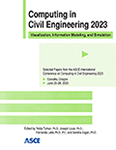Virtual Reality Safety Training Assessment in Construction Management and Safety and Health Management Programs
Publication: Computing in Civil Engineering 2023
ABSTRACT
Ensuring accessible and high-quality safety training is critical for preventing injuries and fatalities on construction job sites, especially considering the potential impact on the staggering number of over seven million construction workers in the United States. Construction workers accounted for approximately 20% of worker fatalities, equating to one in every five deaths annually. Although relatively new, virtual reality (VR) safety training has significant potential for improving safety training with immersive experiences and interactive environments. However, the effectiveness of VR safety training remains unknown, and limited studies are available. To investigate VR safety training efficacy, the authors compared pre- and post-training between a control and an experimental group to evaluate knowledge comprehension and retention. The control group participated in traditional school-based and physical simulation learning, while the experimental group completed both the VR safety training and the same training as the control group. The study focused on two safety topics: fire safety and confined space safety. The results demonstrate that VR safety training significantly improves learner comprehension and retention of safety knowledge, supporting its potential as an effective training tool for construction workers. The study also revealed that the immersive VR experience was user-friendly and contributed to increased self-confidence in understanding safety procedures, knowledge, and practices.
Get full access to this article
View all available purchase options and get full access to this chapter.
REFERENCES
Allcoat, D., and von Mühlenen, A. (2018). Learning in virtual reality: Effects on performance, emotion and engagement. Research in Learning Technology, 26.
Hamilton, D., McKechnie, J., and Edgerton, E. (2021). Immersive virtual reality as a pedagogical tool in education: a systematic literature review of quantitative learning outcomes and experimental design. J. Comput. Educ. 8, 1–32. https://doi.org/10.1007/s40692-020-00169-2.
Hussain, R., Pedro, A., Lee, D. Y., Pham, H. C., and Park, C. S. (2018). Impact of safety training and interventions on training-transfer: Targeting migrant construction workers. Int. J. Occup. Saf. Ergon.
Jeelani, I., Albert, A., and Gambatese, J. A. (2017). Why do construction hazards remain unrecognized at the work interface? Journal of Construction Engineering and Management, 143(5), 04016128.
Jensen, L., and Konradsen, F. (2019). A review of the use of virtual reality head-mounted displays in education and training. Education and Information Technologies, 23, 1515–1529.
Likens, S., and Eckert, D. L. (2021). How virtual reality is redefining soft skills training. PricewaterhouseCoopers: London, UK.
Mujber, T. S., Szecsi, T., and Hashmi, M. S. (2004). Virtual reality applications in manufacturing process simulation. Journal of materials processing technology, 155, 1834–1838.
Ramsey, K., and Dang, H. (2022). The Perception of Virtual and Augmented Realities in the Construction Industry based on Contractors’ Perspectives in Washington State. ASCE International Conference on Computing in Civil Engineering 2021. https://doi.org/10.1061/9780784483893.160.
Robson, L. S., et al. (2011). A systematic review of the effectiveness of occupational health and safety training. Scandinavian Journal of Work, Environment & Health, 38(3), 193–208. https://doi.org/10.5271/sjweh.3259.
Tam, V. W., and Fung, I. W. (2012). Behavior, attitude, and perception toward safety culture from mandatory safety training course. Journal of Professional Issues in Engineering Education and Practice, 138(3), 207–213.
Tezel, A., Dobrucali, E., Demirkesen, S., and Kiral, I. A. (2021). Critical success factors for safety training in the construction industry. Buildings, 11(4), 139.
Wilkins, J. R. (2011). Construction workers’ perceptions of health and safety training programmes. Construction Management and Economics, 29(10), 1017–1026.
Zippia. “25 Essential US Construction Industry Statistics [2023]: Data, Trends And More” Zippia.com. Mar. 6, 2023, https://www.zippia.com/advice/us-construction-industry-statistics/.
Information & Authors
Information
Published In
History
Published online: Jan 25, 2024
ASCE Technical Topics:
- Business management
- Construction engineering
- Construction management
- Construction sites
- Design (by type)
- Education
- Employment
- Engineering fundamentals
- Fire resistance
- Labor
- Models (by type)
- Occupational safety
- Personnel management
- Practice and Profession
- Public administration
- Public health and safety
- Safety
- Simulation models
- Structural design
- Training
Authors
Metrics & Citations
Metrics
Citations
Download citation
If you have the appropriate software installed, you can download article citation data to the citation manager of your choice. Simply select your manager software from the list below and click Download.
